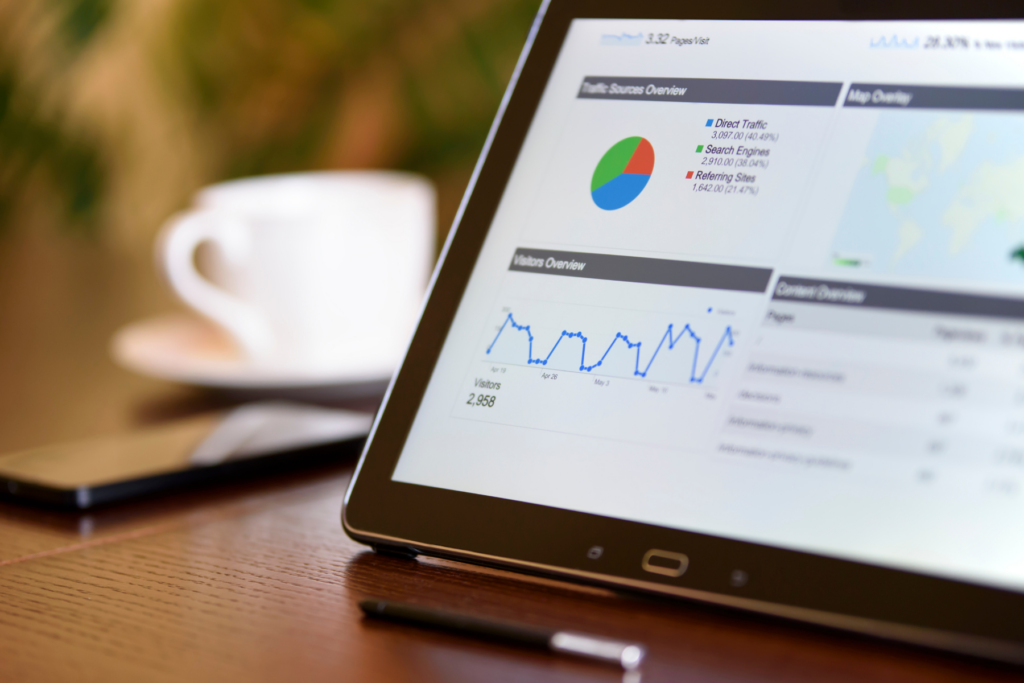
Google Analytics to jedno z najważniejszych narzędzi do analizy internetowej, które pomaga właścicielom witryn i specjalistom od marketingu zrozumieć, jak użytkownicy wchodzą w interakcję ze stroną. Dzięki szerokiemu zakresowi wskaźników i metryk, Google Analytics allows you to accurately monitor and analyse user behaviourwhich is key to optimising your website and increasing the effectiveness of your marketing efforts. In this article, we will look at the most important metrics available in Google Analytics and what they mean.
What are Google Analytics metrics?
Metryki w Google Analytics to wskaźniki dostarczające danych na temat np. ruchu na stronie, zachowania użytkowników oraz konwersji. Pozwalają one mierzyć i analizować różne aspekty funkcjonowania witryny, takie jak liczba wizyt, czas spędzony na stronie czy źródła ruchu. DThis enables you to make informed decisions about optimising your website and adapting your marketing strategies to the actual needs of users.
The main categories of metrics in Google Analytics:
- Visitor metrics
- Behavioural metrics
- Conversion metrics
- Content metrics
- Traffic source metrics
- E-commerce metrics
- Technical and mobile metrics
- Event metrics

Description of metrics in Google Analytics
Technical and mobile metrics
These indicators provide information about the technology used by users when using the website:
- Information on what device the website visitor used, e.g. computer, tablet, smartphone.
- Information about the operating system in use during the site visit.
With this data, you can optimise your website for different devices.
Traffic source metrics
With these indicators, you can find out where your website traffic is coming from:
- Traffic acquisition channels
Traffic acquisition channels show where users are coming to your website from. The primary sources are:
- Traffic from search engines
- Direct traffic when a user types in a website address
- Traffic from external links
- The social media movement
- Traffic from paid advertising campaigns
Analysing traffic sources allows you to optimise your advertising campaigns and focus on the channels that deliver the best results.
Event metrics
Metryki zdarzeń mierzą interakcje użytkowników z różnymi elementami strony:
- User actions on the site, such as clicks, video plays or file downloads.
- Additional information that helps analyse specific user activities in detail.
Visitor metrics
These metrics measure site traffic, providing the following information:
- Number of visits to the site. A session is a user's interaction with a website over a specified period of time.
- Number of first-time visitors to the site.
- The number of visitors to the site over a certain period of time.
Behavioural metrics
These metrics show how users navigate the site, which pages they visit first and where they leave the site. This metric helps you understand which pages are most important in the conversion path.
We receive the following information:
- Average number of pages viewed per session
- The average time users spend using the website.
- The rejection rate, which is the percentage of sessions in which a user leaves the site after viewing a single sub-page.
A high rejection rate may indicate problems with the user interface or poorly tailored targeting.
Content metrics
These indicators show which pages generate the most user engagement:
- Total number of impressions of all pages on the site.
- Number of views of a given subpage.
It is worth monitoring this data in order to better understand which content gets the most traffic and brings the most value.
E-commerce metrics
For online shop owners, e-commerce metrics are invaluable as they allow them to accurately monitor sales performance:
- Number of transactions made.
- Total income generated by transactions.
- Average value of a single order.
Tracking these indicators will help optimise the sales process and increase revenue.
Conversion metrics
These metrics are key to evaluating the effectiveness of marketing campaigns and the achievement of business objectives:
- The number of targets previously defined in Google Analytics (e.g. purchase, registration) achieved.
- Percentage of sessions that completed a specific objective.
Analysis of these indicators helps to measure the effectiveness of promotional campaigns and sales strategies.

Which metrics are most important?
There is no one-size-fits-all answer to the questionwhich metrics are the most important, as this depends on the goals a company wants to achieve. Nevertheless indicators such as number of users and sessions, rejection and conversion rates are largely crucial for most companies.
For example, if one advertising campaign brings in a significant number of new users, but their rejection rate is high, this may suggest a need to improve the content or change the landing page.
Analysing user behaviour and the effectiveness of marketing campaigns provides valuable information on how visitors interact with your site and what actions they take. This enables you to determine more accurately, which marketing channels attract the most valuable users and which marketing activities have the greatest impact on business results.
Summary
Knowing and monitoring the metrics mentioned not only allows you to understand how users interact with the site, but also for optimising content and marketing campaigns. By regularly analysing metrics such as visits, behaviour, conversions or traffic sources, you can improve the quality of your website and maximise your profits. It is useful to constantly react to changing datato succeed in the online world.

 4 minutes reading
4 minutes reading


